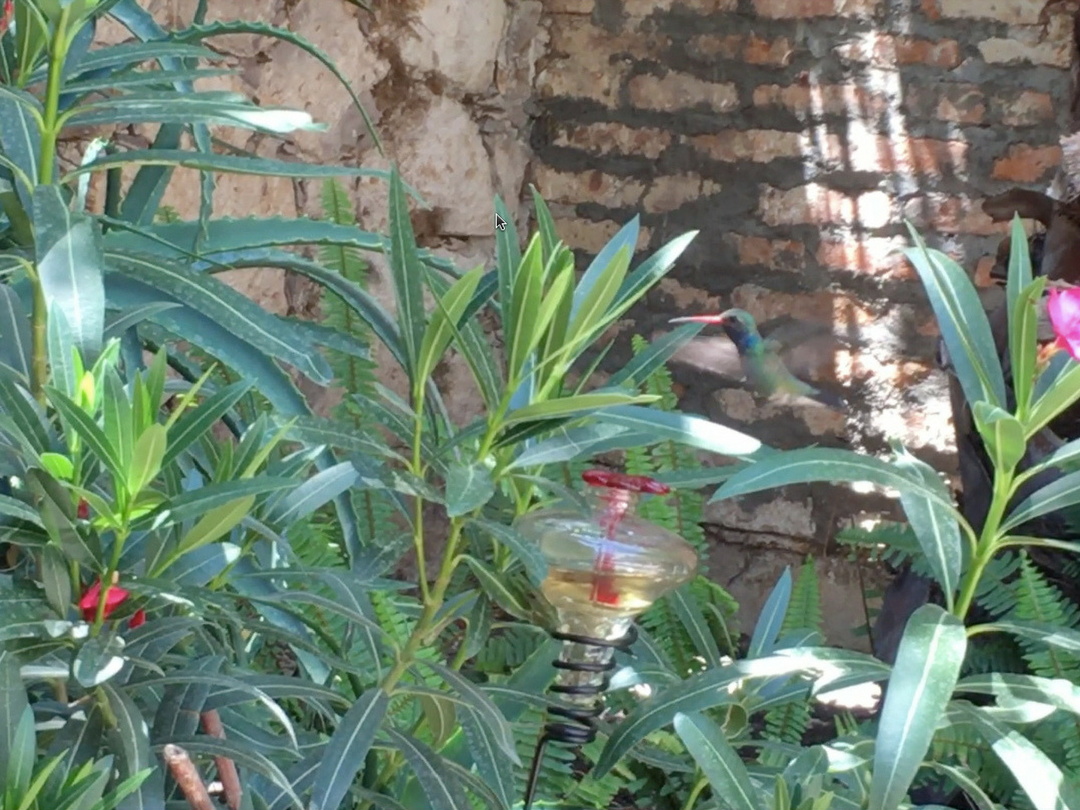Tales from the Querying Trenches
One of my favorite activities (or lack of activity) in San Miguel is to watch the hummingbirds in our garden. Lately, as I’m deep into book querying (that's when you search for an agent), I’m increasingly drawn to these tiny flying frenzies, and I’ve been trying to figure out why.
My life as a writer is more peaceful than my previous corporate life, even if full of micro disappointments, as writer’s lives tend to be. So why relate to a bird that lives every day on the knife-edge of oblivion?
I’ll be lying in the hammock, immersed in a book when I hear that familiar machine gun volley of chirps and a bright azure spark will be hovering by the feeder, its wings thrumming, guzzling sugar water as if its life depended on it. Which, in fact, it does.
I believe that daily frenzied struggle, with no option to quit, is why these birds have me captivated.
As I wait to hear back from agents on my book, attempting to strike a precarious balance between optimism and despair, I’m increasingly drawn to the avian equivalent of the little engine that could.
You see, evolution dealt these little critters a hard blow. Originally derived from swifts (you can see the similarities when they dive), hummingbirds lost more and more weight as generations went by. They developed a unique figure-of-eight wing flap, all to better to hover next to flowers. But this helicopter-style flight (they can fly horizontally and upside down) takes a huge toll on their metabolism.
Flapping one's wings at up to 80 strokes a second requires their tiny heart to beat over 1200 times a minute. With a frighteningly fast metabolism to power all that activity, they must find and consume more than half their body weight in sugar every day, just to survive.
Which means every time a hummingbird stops eating, they risk dying. At night, to avoid a scenario where their bodies stop functioning for lack of sugar, they go into a state of torpor, aka short term hibernation (where their metabolic rate drops by 95% and heart drops to only 50 instead of 1200 beats a minute).
The fact is that very morning a hummingbird risks being too weak to kick-start its own heart and never waking up again.
So why do hummingbirds speak to me as a writer
I’m sure you’ve heard the phrase ‘write or die’, but it’s not as if I believe that to be true. For me, writing is a privilege I’m afforded because I’m not living on a knife edge, unable to pay the rent this month (although it helps to pay rent at Mexico rates!)
However, this lack of struggle (not writing for survival) also increases the temptation to quit, or at least to stop believing. When an agent doesn’t appreciate my ‘"voice" or doesn't "connect with my characters", it’s all too easy to fall into the self-pity trap of thinking perhaps I’m not cut out for this writer thing?
And then there’s writer jealousy. You know that habit of comparing oneself to other writers that pokes in uninvited and asks questions like “Why did she get an agent before me?” or “Did you see how much more beautiful her writing is than yours?”.
Even while writing this blog post I discovered an essay from a writer who passed away, which talks of hummingbirds with more eloquence than I ever could. This happens to me rather often. My style and voice are commercial and I pine after literary writing, despite knowing that particular style isn’t my gift to share with the world.I
’m going to pause and quote some of that amazing essay by Brian Doyle, because part of my journey is learning to appreciate the work of others who have different talents and I just adored his writing.
“Hummingbirds, like all flying birds but more so, have incredible enormous immense ferocious metabolisms… Their hearts are stripped to the skin for the war against gravity and inertia, the mad search for food, the insane idea of flight. The price of their ambition is a life closer to death; they suffer more heart attacks and aneurysms and ruptures than any other living creature. It’s expensive to fly. You burn out. You fry the machine. You melt the engine. Every creature on earth has approximately two billion heartbeats to spend in a lifetime. You can spend them slowly, like a tortoise and live to be two hundred years old, or you can spend them fast, like a hummingbird, and live to be two years old.”
From The American Scholar: Joyas Voladoras (Flying Jewels)
Beautiful, right?
I’ve finally realized what appeals is hummingbirds' very audacity to believe in their right to exist.
For me, hummingbirds represent an invitation to gratitude. Most nights I go to bed without fear of not waking up tomorrow. Without fear that if I stop fighting, I won’t survive and neither will my family. That’s a privilege most on this planet don't have. And for this I am grateful.
Will I find a publisher for my first book? I sure hope so, but regardless I continue to learn and evolve as a writer. Watching their frenzied fight is a reminder that I have a gift to give, whether others yet recognize it or not.
As Doyle points out in the article above, we only have so many heart beats in this life. I've chosen to use mine writing.
I'm also proud to be part of an amazing community of writers through the Women's Fiction Writers Association who support each other on this great journey of creativity - including coping with rejection. And for this I could not be more grateful.
From now on, every time I see a hummingbird, I'll consider it a call to touch base with that gratitude.
References (if you’d like to learn more about hummingbirds):
25 Fun Facts about Hummingbirds
How do Hummingbirds survive Cold Nights? Hummingbirds and Torpor


